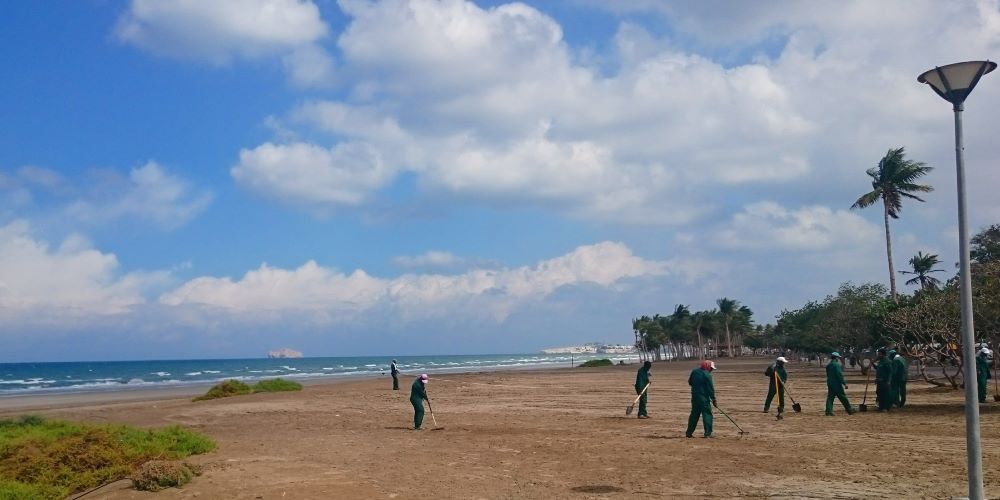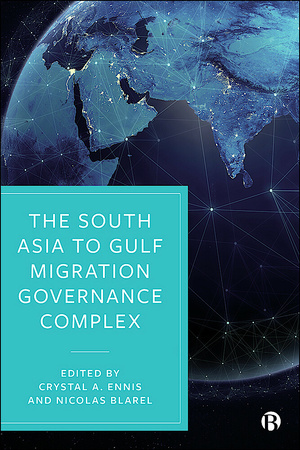Projects
What am I working on now?
My growing research agenda examines the impact of AI, digital, and gig platforms on workers and labour markets, and how immigration regimes change in response. I also have ongoing projects on labour and migration regimes.
Labour and Migration Regimes in the Platform Economy
I am developing grant applications for a large, multi-researcher project on this topic, comparing across South East and West Asia. An early study on this topic was recently published in the Global Labour Journal.
Ennis, C.A. (2025) “Driving Gigs in Oman: Women and Techno-Fixes in the Platform Economy,” Global Labour Journal 16(1). DOI:
Governing Delivery Platform Companies
Collaborating with Yujing Tan and Shivant Jhagroe, Governing Delivery Platform Companies (GDPC) received a Seed Grant from Global Transformations & Governance Challenges (GTGC) to fund the project and a small team of RAs.
GDPC examines the interaction between platform companies, local authorities, workers, and households to understand the multilevel governance of delivery platforms. With both national and international companies operating in the market, the expansion of global platform capitalism raises concerns and critique. To counter a perceived erosion of local authority, various countries, particularly in Europe, have introduced anti-trust legislation against such BigTech companies. Yet such national regulatory initiatives have not dulled the market ambitions of global platform companies even as demand patterns change in the wake of the COVID-19 pandemic. These platforms lead to new social challenges, new uses of urban space, new forms of labour precarity, and new governance constraints. Basing its fieldwork on three urban spaces in the Netherlands – the Hague, Amsterdam, and Leiden – GDPC studies three key stakeholders to answer how the governance of delivery platform companies transpires. (1) We interview platform workers (who are largely migrant workers) to understand their working experience, perceptions of opportunity and precarity, and ways of negotiating their labour and legal contracts. (2) We interview employers and managers of delivery platform companies and companies that subcontract deliver to them to understand the daily management of delivery and hiring. (3) We interview municipal, regional, and national government officials to understand how they attempt to regulate these companies and their impact on urban space, services, and residents. Together, this knowledge will contribute to studies of global platform capitalism and labour migration, the changing role of the state vis-a-vis the gig economy, and the changing role of local governments in the decentred management and employment schemes of global food delivery platforms.
Labour Governance in the Arabian Peninsula and Indian Ocean World
One of my large passion projects has centred on labour history, governance, and development trajectories in Oman. In 2024 a major outcome of this work was published with Cambridge University Press.
The book, Millennial Dreams in Oil Economies: Job Seeking and the Global Political Economy of Labour in Oman, retells Oman's development story from the perspective of labour, moving beyond the traditional focus on oil. Focusing on the experiences of workers, the unemployed, and the governance of labour markets, it explains the Gulf's global labour markets and position in global capitalism. The book makes a case for de-exceptionalising the Gulf, demonstrating how the region's labour markets are global and subject to similar pressures as other global economies. Moreover, the contemporary governance, regulatory, and resistance milieu around work has lineages that extend from the colonial and oil industry labour practices and discourses through the era of neoliberal reform to the present. Offering a fresh perspective on regional development and what I call "rentier neoliberalism," the book also provides a rich analysis of the historical lineages of labour governance, class formation, and following protests since 2011 as youth unemployment soared in the region, how authoritarian states react to public pressure and the prospect of social unrest around perceived economic decline.
Global Migration Governance
"The Globalised Politics of Connectivity and Governance in the South-to-West Asian Migration Corridor," Grant: Asian Modernities and Traditions (AMT) Phase II, Large Research Grant (€150,000 2017-2019). C.A. Ennis & N. Blarel.

Gulf countries host nearly 21 percent of global labour migrants and the destination of a majority of South Asian migrant workers is West Asia. Despite the global significance of the South-to-West Asia migration corridor, it receives limited attention in global migration governance scholarship. To address this gap, Crystal Ennis and Nicolas Blarel examine the process through which expatriates across South and West Asian countries become increasingly active in migration governance and diplomacy. Migration governance has increased in complexity and plays out at multiple levels - domestic, regional, and global. New technologies and increased connectivity provide new opportunities for individual actors and collectives to be active in the migration governance milieu. This project analyses the interdependent roles between two levels of actors: South Asian migrants in the Gulf who increasingly take advantage of globalised levels of governance and in their home-state to improve their living conditions; and home states in South Asia which are concurrently integrating the welfare of migrants in their foreign policies toward the Gulf and using migrants as a tool of diplomacy. This project evaluates the long-term effects for global governance of the increasing political embeddedness and connectedness between migration and domestic and foreign affairs across migration corridors.
A major outcome of the project is this edited volume:

Going beyond state-centric analysis, Nicolas and I, along with our contributors, present a multi-layered account of the ‘migration governance complex.’ We offer insights not only into the actors involved at the different scales of migration governance, but also into the varying ways of interpreting and explaining the meaning and value of these interactions. Together, they enable readers to better understand migration, labour mobilities, politics, and rights in this important region, while also providing a model for analysing global migration governance in practice in different parts of the world.
MARS: Non-Western Migration Regimes in a Global Perspective (2024 - 2028) is a Horizon MSCA Staff Exchange Consortium project led by a team at Lund University (€1,656,000 grant shared between 8 beneficiaries). I am the Leiden PI, collaborating with Katharina Natter. Through the project, we are receiving visiting scholars from, and sending Leiden scholars to, partner universities around the world. Through such research and collaborations, we are collectively building a body of scholarship on non-western migration regimes.
Health Care Worker Migration
Studying migration governance in the corridors between South and Southeast Asia and the Gulf reveals that important insights can be generated by focusing on sectoral or occupational case studies. Here are a couple of articles examining health care work.
Ennis, C A. (2022), “Networking through Kafala: Skilled workers and transnational networks in the governance of health care migration in the Gulf,” in M. Walton-Roberts (ed), Global Migration, Gender and Health Professional Credentials: Transnational Value Transfers and Losses (University of Toronto Press)
Ennis, C A. & M. Walton-Roberts (2018). “Labour market regulation as global social policy: The case of nursing labour markets in Oman,” Global Social Policy 18(2): 169-188
The Pursuit of Knowledge Economies: Innovation and Entrepreneurship Promotion
This research made two significant knowledge contributions. First, it contributed to 'new' rentier state literature by demonstrating how entrepreneurship promotion in Gulf economies became another vehicle for state patronage. I showed how the mechanisation of SME support by familiar rentier patterns reproduced structural problems in the economy without resolving the fiscal and social challenges it was meant to address. A second contribution was my intervention in development debates on gender and entrepreneurship where I show how intersections of gender with entrepreneurship, neoliberalism, and broader economic transitions (rising consumerism, growing middle class, energy diversification, etc) affect socio-economic inequality and change.
This research area received two significant research grants, (a) Social Science and Humanities Research Council of Canada (SSHRC) (2012-13, $20,000) and (b) Balsillie Doctoral Fellowship (2009-13, $85,000). Some of my writing on this theme are listed below:
Ennis, C.A. (2019) “The Gendered Complexities of Promoting Female Entrepreneurship in the Gulf,” New Political Economy 24(3): 365-384
Ennis, C.A. (2019). “Rentier-preneurship: dependence and autonomy in women’s entrepreneurship in the Gulf,” Project on Middle East Political Science, POMEPS Studies 33: 60-66
Ennis, Crystal A. (July 2017). “Entrepreneurship Promotion and the Sustainable Development Goals,” MUNPlanet
Ennis, C.A. (2015). “Between Trend and Necessity: Top-Down Entrepreneurship Promotion in Oman and Qatar,” The Muslim World, 105(1): 116-138
Ennis, C.A. (2013) Dissertation: “Rentier 2.0: Entrepreneurship Promotion and the (Re)Imagination of Political Economy in the Gulf Cooperation Council Countries,” Awarded by the University of Waterloo.
Emerging Economies' Foreign Aid, Investment, & Policy
I have devoted research time to various smaller projects looking at more traditional political and international relations questions, where I have been interested in south-south development cooperation and the economic relations between "emerging economies" or "rising powers" including in the context of China's Belt and Road initiative and growing economic ties between China and West Asia and India and West Asia. Some of these publications are below:
Ennis, C.A. (2018). “Reading Entrepreneurial Power in Small Gulf States: Qatar and the UAE,” International Journal73(4): 573-595
Ennis, C.A. (2016). “Situating the Gulf States in the Global Economic Redrawing: GCC-BICs Relations,” in S.F. Christensen & L. Xing, Emerging Powers, Emerging Markets, Emerging Societies: Global Responses. Palgrave Macmillan: 132-161
Ennis, C.A. & B. Momani (2013). “Shaping the Middle East in the midst of the Arab Uprisings: Turkish and Saudi foreign policy strategies,” Third World Quarterly, 34(6): 1127-1144
Momani, B. & C.A. Ennis (2012). “Between Caution and Controversy: Lessons from the Gulf Arab States as (Re)Emerging Donors.” Cambridge Review of International Affairs. 25(4): 605-627
Ennis, C.A. & P. Doherty (2011). "Repositioning the Gulf: The GCC in the 21st Century Global Political Economy," in M. Legrenzi & B. Momani (eds), Shifting Geo-Economic Power of the Gulf: Oil, Finance and Institutions. Ashgate
I also have an ongoing research project on South-south trilateral development cooperation between China and Gulf countries in Africa with Jue Wang. So far, this research has taken us to Tanzania, Oman, and China.
